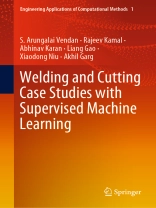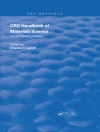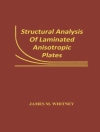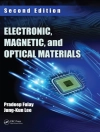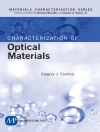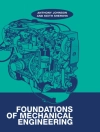This book presents machine learning as a set of pre-requisites, co-requisites, and post-requisites, focusing on mathematical concepts and engineering applications in advanced welding and cutting processes. It describes a number of advanced welding and cutting processes and then assesses the parametrical interdependencies of two entities, namely the data analysis and data visualization techniques, which form the core of machine learning. Subsequently, it discusses supervised learning, highlighting Python libraries such as Num Py, Pandas and Scikit Learn programming. It also includes case studies that employ machine learning for manufacturing processes in the engineering domain. The book not only provides beginners with an introduction to machine learning for applied sciences, enabling them to address global competitiveness and work on real-time technical challenges, it is also a valuable resource for scholars with domain knowledge.
Tabla de materias
Supervised machine learning in magnetically impelled arc butt welding (MIAB).- Supervised machine learning in cold metal transfer (CMT).- Supervised machine learning in friction stir welding (FSW).- Supervised machine learning in wire cut electric discharge maching (WEDM).- Appendix: coding in python, numpy, panda, scikit-learn used for analysis with emphasis on libraries.
Sobre el autor
Dr. S. Arungalai Vendan is an Associate Professor, Innovation Labs, School of Engineering, Dayananda Sagar University, Bangalore, India. He has been working on advanced welding processes since 2006. He received his Ph.D. degree from the National Institute of Technology, Tiruchirappalli, India in 2010. He has successfully completed several government-funded research projects and industrial consultancy projects, and has published more than 100 research papers in international journals and conference proceedings. His research interests mainly focus on the interdisciplinary science which has confluence of terminologies from electrical/mechanical/metallurgical/materials and magnetic technologies.
Dr. Rajeev Kamal received his B.Tech. and M.Tech. degrees in Electronics & Communication Engineering and VLSI design from Dr. A.P.J. Abdul Kalam Technical University Uttar Pradesh and Guru Gobind Singh Indraprastha University, India in 2006 and 2008 respectively and the Ph.D. degreein Electronics Engineering from Technical University of Catalonia, Spain, in 2017. Since January 2018, he has been in the Department of Electronics Engineering, School of Engineering, Dayananda Sagar University as an Associate Professor. Dr. Rajeev focuses on the research of On-chip interconnection infrastructure and System on chip architecture. His recent research interests include: Globally Asynchronous locally Synchronous System, System on Chip, FPGA Architecture for the AI/ML. Dr. Rajeev has published several peer-reviewed technical papers in international journals and conferences. He is a member of IEEE and served as a reviewer of several international journals. He was a recipient of Postgrads fellowship award from Indian governments during his M.Tech. His received three Best Paper Awards at the IEEE International Conference held in India.
Mr. Abhinav Karan is an Assistant Professor in the Department of Electronics and Communication, School of Engineering, Dayananda Sagar University, Bangalore, India. He obtained his M.Sc. in Applied Computing from School of Computing from Edinburgh Napier University, Scotland, UK and also M.S. in Embedded Systems from Manipal Centre for Informational Science from Manipal University, Manipal, India. He has successfully completed several research projects and industrial consultancy projects. His research interests mainly focus on machine learning, deep learning and Advanced Driver Assistance Systems.
Prof. Liang Gao is a Professor of the Department of Industrial and Manufacturing System Engineering, School of Mechanical Science and Engineering, Huazhong University of Science and Technology (HUST), Wuhan, China and Vice Director of State Key Laboratory of Digital Manufacturing Equipment, HUST. He received the B.Sc. degree in Mechatronic Engineering from Xidian University, Xi’an, China in 1996, and the Ph.D. degree in Mechatronic Engineering from HUST, Wuhan, China in 2002. He has published over 220 refereed papers. Prof. Gao’s current research interests include optimization in design and manufacturing. He currently serves as Co-Editor-in-Chief of Collaborative Intelligent Manufacturing, and Associate Editor of Swarm and Evolutionary Computation, Journal of Industrial and Production Engineering and an editorial board member of European Journal of Industrial Engineering, Operations Research Perspectives. He also served as guest editor for Journal of Cleaner Production, International Journal of Computer Applications in Technology, and International Journal of Advanced Manufacturing Technology.
Dr. Xiaodong Niu is currently working as a Professor and the Head of the Department of Mechatronics Engineering at Shantou University. He received his Ph.D. degree from National University of Singapore (NUS), Singapore. He has worked in Toyota Central Research Institute, Japan from 2006 to 2008 and worked as an Associate Professor at Doshisha University, Japan from 2008 to 2012. His mainresearch interests include computational modeling, analytical methods, computational fluid dynamics and optimization. He has published over 90 SCI Journals in the fields of computational modeling, analytical methods, fluid dynamics and optimization.
Dr. Akhil Garg is currently working as an Associate Professor in the Department of Mechatronics Engineering at Shantou University, China. He received his Ph.D. degree in Mechanical and Aerospace Engineering from Nanyang Technological University (NTU), Singapore in 2015. His main research interests include mathematical modelling, robust optimization, evolutionary algorithms, design for energy storage systems, applications of AI in sustainable manufacturing. He has published over 70 SCI journal articles, 2 books and over 1000 Web of Science citations. He has around 15 papers listed as “Highly Cited” in Web of Science and 2 ESI hot papers. He is currently serving as an editorial board member of SCI Mathematical Problems in Engineering and Deputy Editor-in-Chief of Collaborative Intelligent Manufacturing.
